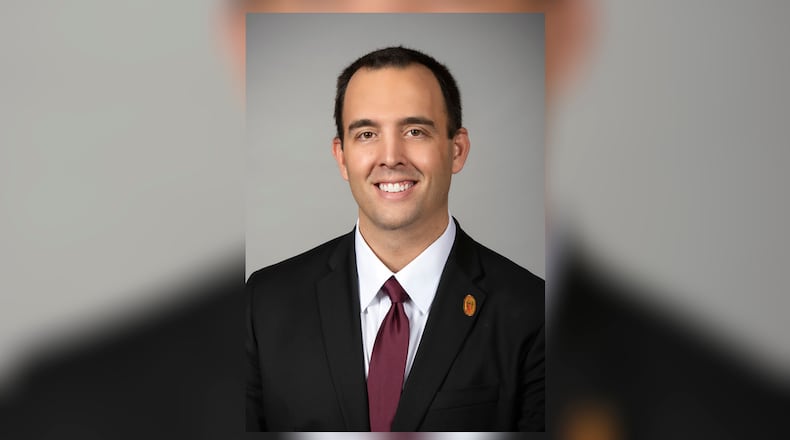Mathews’ bill would open school librarians and K12 teachers, other than health and biology teachers, up to fifth degree felony charges for the criminal charge of pandering obscenity, which is defined under Ohio law as something that is predominantly sexual in nature when it comes to adults, but that interpretation is more ambiguous when it comes to minors.
Jeff Wensing, vice president of the Ohio Education Association, believes the bill sends the wrong message.
Wensing told this news organization that there’s no indication that teachers or school librarians have pandered what a reasonable person would consider to be obscene material in Ohio.
“It’s my belief, and our belief, that this is another bill crafted by certain legislators in an attempt to divide communities and take another shot at public education,” Wensing said.
Mathews shied away from any assertion that obscenity is already being used in K12 classrooms or libraries, but he noted that he’s heard from “many” of his constituents in House District 56 — which contains his hometown of Lebanon along with Mason and the central and southwest reaches of Warren County — who hold concerns that specific books or lesson plans have encroached on obscenity.
The freshman legislator did not respond to this news organization’s request for him to share what books or lesson plans his constituents have flagged.
The bill comes amid a larger debate over banning books in public schools. The Troy City Schools Board of Education recently reviewed nine books that a resident claimed contained sexually explicit material and last month removed one book from school libraries and limited one other to high school students only. The other seven were left alone.
The books that were challenged predominantly dealt with transgender issues.
In a statement, the Ohio Education Association predicted that H.B. 556 would bring a chilling effect in Ohio’s classrooms “by making trained, experienced professionals unsure whether the necessary, legitimate education materials they have been using with their students would be safe under this dangerous law,” while also making Ohio a less attractive place to teach.
Mathews pushed back on the notion that teachers would be unsure of what they’re allowed to use in the classroom. He noted that obscene material, both as it’s defined in Ohio legal code and as it’s understood in courts of law, are things like “severe violence and brutality,” and would not be construed to include run-of-the-mill teaching devices like pictures of Michelangelo’s David or things of the like.
“What we really want to do is make sure that the trust is there between our parents and teachers and students,” Mathews said. In his view, H.B. 556 doesn’t assert that the problem already is rampant, but puts guardrails in place to put the minds of concerned parents at ease in the future.
Wensing told this news organization that even if the bill is meant to boost that trust, the actual thrust of the bill would unduly open teachers, librarians and schools to greater public scrutiny and civil lawsuits brought by aggrieved parents.
“What is obscene to someone who is a very conservative individual may not be seen as obscene to someone who is in the middle, let alone someone who is more liberal,” Wensing said.
When this news organization asked Mathews about educators’ concerns, he reiterated his belief that the state has a vested interest in this space.
“Ultimately, when you have a government institution — and schools are government institutions — the state ends up being the final arbiter in making sure that we are the ones to ensure the trust is there,” Mathews said.
The Ohio Library Council, which represents Ohio’s public libraries and not school libraries, also told this news organization that they have concerns with the bill’s direction, but declined to go into the specifics. Mathews said he ensured the state’s public libraries that this bill would have no impact on their criminal liability.
H.B. 556 was has been referred to the House Criminal Justice Committee and has not yet had a hearing.
For more stories like this, sign up for our Ohio Politics newsletter. It’s free, curated, and delivered straight to your inbox every Thursday evening.
Avery Kreemer can be reached at 614-981-1422, on X, via email, or you can drop him a comment/tip with the survey below.
About the Author

